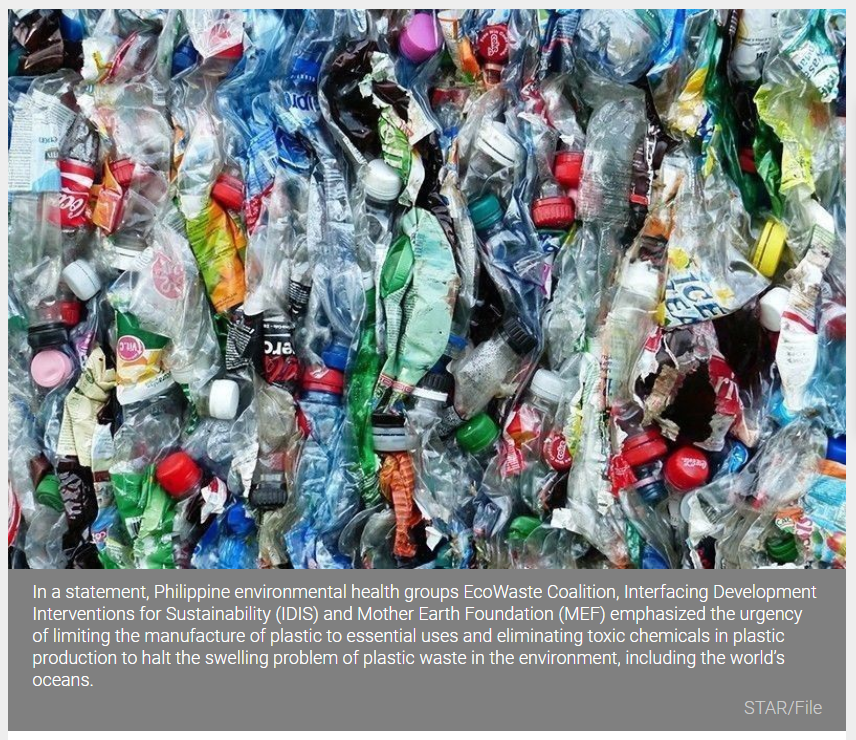Philippines: Government urged to take action vs plastic woes
MANILA, Philippines — Three environmental groups are urging the government to take action against plastic pollution caused by waste management schemes such as incineration by limiting the production of plastic.
In a statement, Philippine environmental health groups EcoWaste Coalition, Interfacing Development Interventions for Sustainability (IDIS) and Mother Earth Foundation (MEF) emphasized the urgency of limiting the manufacture of plastic to essential uses and eliminating toxic chemicals in plastic production to halt the swelling problem of plastic waste in the environment, including the world’s oceans.
The groups’ call for drastic action to combat plastic pollution was prompted by a recent report “Plastic Waste Management Hazards: Waste-to-Energy, Chemical Recycling and Plastic Fuels” by Japan-based International Pellet Watch (IPW) and Sweden-based International Pollutants Elimination Network (IPEN), which showed that chemical recycling, plastic-to-fuel, and incineration to manage plastic waste is generating high volumes of highly hazardous waste and toxic emissions.
“No current management method for plastic waste is capable of alleviating the world’s expanding plastic pollution crisis. All methods generate significant toxic hazards because of the toxic additives that are a component of most plastic products. Industry’s championing of various recycling schemes is a marketing ploy designed to fend off plastic regulation and efforts to curb an escalating plastic pollution problem.”said report co-author Lee Bell.
“The only solution to the plastic waste piling up in our communities and oceans is to limit plastic production to essential uses and eliminate the use of toxic chemicals in plastics,” said Bell, who is also the IPEN Policy Advisor on Persistent Organic Pollutants.
For his part, international scientist on hazardous chemicals and plastics Shige Takada said the plastic’s toxic chemicals have been found across the world’s oceans, coastlines and in the isolated polar regions.
“Fish and seabirds swallow plastic waste contaminated by these toxic UV stabilisers, and it builds up in the food chain. It is very concerning and must be prohibited internationally. Our studies show that plastic waste is not inert, it transports the toxic additives for thousands of miles impacting global ecosystems,”he said.
Findings of the report show that the problem of plastic pollution is seen to get worse in the future as plastics production is expected to grow exponentially from 335 million tons in 2016 to 1,800 million tons by 2050 as the petrochemical industry adapts to a carbon-constrained environment by shifting from fuels to the production of chemicals and plastics.
The report also finds that approximately three-quarters of the 8,300 million tons of plastic produced since the 1950s has become waste, and that unless current practices change, 108 million tons of plastic waste will be landfilled, dumped, or openly burned in 2050, mainly in low-income countries.
In a bid to address the further threat of plastic pollution, the report is urging governments to acknowledge and immediately move to limit the growing amount of hazardous waste generated from plastic waste by dramatically reducing the amount of plastic the industry can produce. It emphasized that this can be achieved through an international treaty.
The report is also suggesting that governments must manage existing stockpiles of plastic waste in an environmentally sound manner and encourage industry to develop an environmentally sound, sustainable management system for any plastic produced in the future.
It said this must include the implementation of design, production, and end-of-life management systems that maximize non-toxic polymer reuse and recycling in low-income countries as well as wealthy countries.
“We hope our own government will pay attention to the report’s findings and recommendations as we seek comprehensive, holistic and just decisions and measures to effectively curb plastic waste and pollution locally and globally,” the EcoWaste Coalition, IDIS and MEF said.
Last week, the EcoWaste Coalition along with various environmental advocacy groups and individuals filed a petition at the Supreme Court for the nullification of Department of Environment and Natural Resources (DENR) administrative order 2019-21 which covers the guidelines governing waste to energy (WTE) facilities for the integrated management of municipal solid waste.
The petitioners argued that the issuance and implementation of DAO 2019-21 would result in grave violations of the people’s right to health and the right to a balanced and healthful ecology under the Constitution.
Source: https://www.philstar.com/business/2021/07/23/2114362/government-urged-take-action-vs-plastic-woes


 English
English




